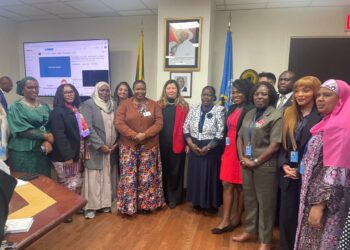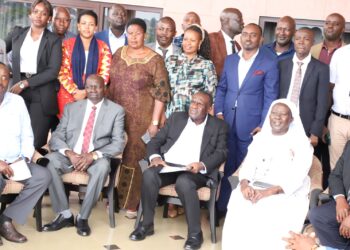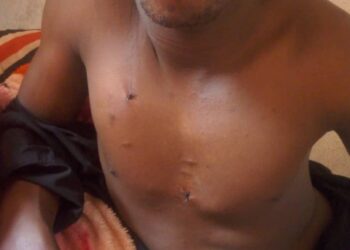Denis Komakech is a blind computer trainer. Komakech works with Oysters & Pearls, an educational programme inclusive of the blind with emphasis on teaching science, technology, engineering and math to students in Uganda.
On Wednesday, July 17, Komakech was at work, briefing workshop participants on the range of assistive devices that can be deployed to cultivate effective and accessible education for learners with disabilities.
The workshop arose from a Uganda Communications Commission (UCC) baseline study of 2018, which sought to establish the extent and patterns of access and usage of Information and Communication Technologies by Persons with Disabilities (PWDs) in Uganda, as well as the challenges faced.
From the findings, it was agreed that a sensitization workshop for People with Special Needs (PSNs), leaders and other stakeholders was necessary to help address some of the cited challenges, especially in education, by increasing awareness on assistive technologies.
And so UCC, through the Rural Communications Development Fund (RCDF), conducted the first regional workshop on increasing navigability and effectiveness of education of People with Special Needs through Assistive Technologies in Gulu on Wednesday, July 17.
The workshop was part of the Commission’s strategy to work towards the removal of barriers to ICT access and to support PWDs through ICTs that might enable them to participate fully and equally in all aspects of modern Ugandan life.
Ministry of Education officials, including District Education Officers, inspectors of schools, headteachers of special needs schools and institutions supporting PSNs were some of the stakeholders invited to the workshop held at Global Friendship Hotel.
Addressing participants and journalists, the Director Rural Communications Development Fund Mr Nyombi Thembo highlighted the main objective of the RCDF, which he said is “to reach out to areas and people who are unserved and underserved.”
Commenting on the one-day event, Mr Thembo added: “Above all, people were very grateful for that initiative, because people with disabilities were represented physically and the outcomes were promising.”
He further noted that the government is committed to supporting People with Disabilities, particularly in the realm of ICTs as RCDF has demonstrated.
“RCDF activities in every part of the country, however small they are, have yielded multiplier effects,” Nyombi said, asking PWDs to suggest how best they think they can be served to benefit from modern technologies.
Speaking on the consultative process leading up to the workshop, Mr. Simon Bugaba, the head of UCC regional offices, revealed that the baseline study, which involved representatives of public institutions, development partners, PWD groups, the private sector, academia and civil society, had tasked UCC to design impactful initiatives that would promote access to and usage of information using ICTs while leveraging on the existing infrastructure and assistive technologies.
With that, RCDF consulted stakeholders, including the National Union of Disabled Persons of Uganda (NUDIPU) and Oysters and Pearls on how best UCC could address the ICT challenges mentioned in the study.
“They all told us it was critical to hold sensitisation workshops for PSN communities, leaders and the rest of the population to help arrest the situation, especially in education, by increasing awareness on assistive technologies,” Mr Bugaba said.
He added that whereas there have been great advances in the development of specialized assistive technology, such as microprocessor-controlled prosthetics or digital hearing aids, more general-purpose technologies such as ordinary computers, tablets and smartphones that offer significant opportunities for broader social and economic inclusion of PWDs have remained inaccessible.
According to Mr Bugaba, the workshop was conceived to build awareness, expand digital literacy, finance the acquisition of devices and software, and provide technical support for the use of ICTs among People with Special Needs (PSNs).
In his speech, the Gulu RDC Mr Okoth Lapolo spoke highly of the partnership between UCC and Oysters and Pearls in helping PWDs.
He said the government was conscious of the saying, Disability is not inability, and is abiding by the principle.
A participant, Reverend Sister Susan Akot Adong, the headteacher at St. Mary Goretti Ngetta Girls Primary School (Blind Annex) in Lira District, expressed worry about the performance of her pupils in mathematics, saying her school has only two computers and lacks the software for blind pupils.
She asked RCDF to support her school with at least five more computers and appropriate software to boost the academic performance of her pupils. Many participants that we interacted with appreciated the UCC initiative.
They said the skills from the workshop would put them in a better position to support the pupils with disabilities in their respective schools.
On his part, Komakech, the computer trainer, said the workshop had helped stakeholders to understand and appreciate the role of ICTs in inclusion and in forging interdependence between learners with disabilities and their counterparts without disabilities.
Do you have a story in your community or an opinion to share with us: Email us at editorial@watchdoguganda.com











